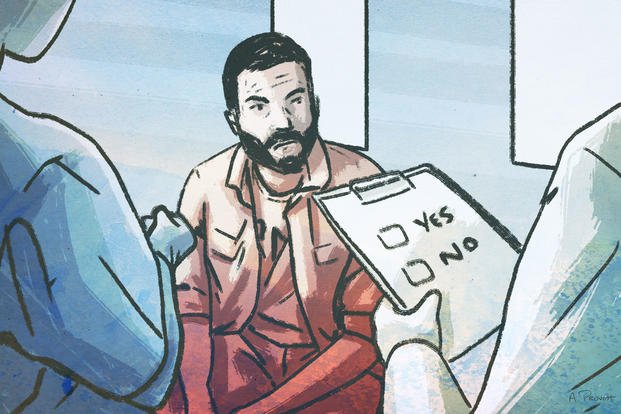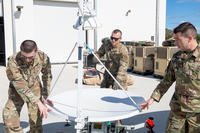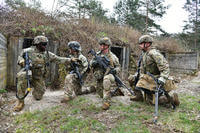This story, part of a series of investigative reporting projects by Military.com on service member and veteran health, was supported by the Pulitzer Center.
Confusing. Lackluster. Generic. A little bit of a letdown.
Those are some of the ways veterans are describing toxic exposure screenings they've gotten at Department of Veterans Affairs health centers, screenings that were designed as a tool to get more vets help after medical evidence accumulated that service had made many sick.
Rolled out with great fanfare in November 2022, toxic exposure screenings for all VA patients were mandated by the PACT Act, the sweeping law passed in August of that year that expanded benefits and health care for millions of veterans exposed to environmental hazards during their military service.
Read Next: They Stood Sentry over America's Nuclear Missile Arsenal. Many Worry It Gave Them Cancer.
Through December, in the first year screenings were available, the VA recorded conducting a little less than 5.1 million screenings, according to data obtained by Military.com through a public records request. That number had risen to about 5.3 million as of the end of March, according to the VA's public PACT Act dashboard.
Whether these screenings are driving a wave of veterans to then get better medical care and benefits is unclear, as vets themselves are painting a mixed picture of the process and experts question whether the screenings are asking the right questions.
Millions of veterans of the post-9/11 wars were exposed to massive trash fires known as burn pits, with many since developing breathing and heart issues, as well as debilitating and fatal cancers such as glioblastoma. Contaminated water at Camp Lejeune, North Carolina; chemical warfare such as using Agent Orange during the Vietnam War; and radiation from working near nuclear weapons have also sickened scores of veterans through the years.
Military.com spoke to a dozen veterans and family members about their experiences with the screenings. Some credited the questionnaire with leading to their doctors conducting more thorough medical exams. But others say it appeared to be a check-the-box exercise that has had no apparent effects on their health care or benefits.
"They didn't do the connecting step, I think is the biggest thing," said Geoffrey Threats, an Army veteran whose deployments included Iraq, Afghanistan, Kuwait and Jordan. "The connecting step of saying, 'OK, now here's how you file a claim if you think you have these things.'"
Threats had a toxic exposure screening in January after scheduling a special appointment for one. A doctor asked him where he had deployed and what his suspected exposures were, then handed him a pamphlet with background information on the PACT Act, he said. He had already filed a disability benefits claim prior to his screening, but he expressed concern for other veterans who may need more guidance on how to file a claim.
"Because you do have veterans who walk in there, they give the survey, and then they walk out, and they continue on with their life," Threats said.
Several veterans who spoke to Military.com said they haven't gotten the follow-up they asked for or that the response was lacking. Military.com solicited feedback on the screenings from its readers, and of 76 people who said they asked for follow-up information, 56 said they did not get it.
In response to the public records request from Military.com, the VA said it isn't systematically tracking any follow-up resulting from the screenings to see whether veterans are getting additional help.
When the agency started the screenings, VA officials promised the three-part questionnaire would help "enhance" benefits for veterans who are already in the system. Lawmakers who wrote the PACT Act touted the screenings as a way to "bolster" VA resources.

Of the patients who were screened as of December, about 2.2 million veterans reported at least one potential exposure. The top issue cited was burn pits as mentioned by just over 1 million veterans, followed by Agent Orange at 708,315 veterans, according to the data obtained by Military.com. Veterans are allowed to name more than one potential exposure.
About one-third of veterans who reported concerns didn't ask for any follow-up information, according to the data. Of those who did want follow-up services, being connected with the Veterans Benefits Administration, or VBA, was the most popular choice, with 807,490 veterans requesting that.
Roughly 600,000 veterans asked for information about the Airborne Hazards and Open Burn Pit Registry, and a little less than that wanted to be connected with a veterans service organization.
Meanwhile, 155,464 veterans asked to be contacted by a "toxic exposure screening navigator." The navigators oversee implementation of the screenings, conduct the screenings when they are done outside of a primary care appointment, and serve as veterans' point of contact when they have follow-up questions or concerns.
But the Veterans Health Administration has no way of tracking whether veterans got the follow-up they asked for, according to the agency's response to Military.com's records request. The VHA is working with the VBA to improve the communication between the two agencies and establish a process to relay important information from the screenings that could help the benefits claims process, the VHA said in its response.
Asked for comment on the veterans who were disappointed in the screenings or said they haven't gotten the follow-up information they requested, VA spokesperson Terrence Hayes told Military.com that veterans with concerns should contact their care team to check on the status of their follow-up or, if they feel their care team is unresponsive, the patient advocate at their local VA facility.
"We will make sure that they get the care they deserve," Hayes said in an emailed statement. "The experience of these screenings varies based on the individual veteran and their circumstances, but our goal is to provide a toxic exposure screening to every veteran we see, and if exposure is reported, to follow up with additional testing. These screenings serve as a resource to provide veterans with the exposure-informed care they deserve."
Are Three Questions the Right Answer?
The screenings were one of the first high-profile actions the VA took after the passage of the PACT Act, a law that's been described as the biggest expansion of veterans benefits in a generation, and the volume of screenings done has become a frequently cited data point for VA officials arguing that the PACT Act has been successful.
The law mandated the screenings be done at least once every five years for every veteran enrolled in VA health care but did not require any specific questions or tests, beyond stipulating that the screening should at a minimum ask about potential exposure to burn pits and about exposures to other toxins "commonly associated" with military service.
The law also didn't mandate any follow-up services after the screenings but said the VA should provide print materials and "outline related resources" available to veterans.
The screenings entail three questions: Do you believe you were exposed to toxins during your military service, what do you think you were exposed to, and do you want any follow-up support?
The screening was developed by the VA's director of primary care operations, according to a September 2022 regulatory filing by the department.
The answers to the questions are being added to patients' medical records to support "longitudinal care" so that physicians can be more alert for symptoms from health problems that may arise later, the VA said in background information included in Hayes' email. Research does not support lab tests or specialty referrals based solely on exposure, so "for most veterans, there will not be testing completed simply as a result of an endorsed exposure," the email said.
Victoria Cassano, a doctor with expertise in occupational and environmental medicine who previously served as the VA's director of radiation and physical exposures, expressed doubt the screenings could provide much useful information, calling the questionnaire "vague." A better screening, she argued, would be for the VA to collect full occupational histories from patients that discuss in detail every job they had in the military.
"Most people, even in the military, don't know what they're exposed to," said Cassano, a Navy veteran. "And so asking those three questions really doesn't help at all, especially when most of the doctors they're talking to don't understand what the exposures are in a given [military occupational specialty] or a given environment."
Cassano agreed that further medical testing wouldn't be warranted after a screening unless a patient has symptoms. Ideally, she said, the screenings should be used to establish a medical surveillance plan to be able to catch "subtle signs" of the development of a disease.
The pamphlets handed to patients after the screening include basic information on types of exposures, web addresses and phone numbers to schedule doctor appointments or file a benefits claim, and a summary of health registries for different types of exposures, according to copies posted on the VA's website and provided to Military.com by a caregiver of a veteran who was screened.
Joe Moss, an Army veteran exposed to toxins when he was stationed at the now-defunct Fort McClellan, went to get a screening at a PACT Act outreach event in March at a VA clinic in Orlando, Florida. There, he discovered his medical records showed he'd already been screened. It turned out that questions he was asked by a VA emergency room doctor when he was having a heart attack months earlier counted as his screening, he said.
"The doctor asked me if I'd ever been exposed to anything, and I said yeah. I thought that was part of their protocol" for diagnosing the heart attack, he said.
The Missing Link
The connection, or lack thereof, between the screening and getting other benefits was one of the top issues cited by veterans who spoke to Military.com.
Tasha Carnahan, an Army veteran who served in Iraq and suffers from chronic sinusitis and rhinitis, said she went into her screening thinking it would help her disability benefits claim, only for the doctor to tell her the screening was just for the VA to collect data.
"You see everything that says about the PACT Act and benefits for veterans that have been exposed to toxic exposures, but when you actually go there, they just say, 'Thank you for letting us know, it's going to be annotated,' and that's it," she said, adding that her primary care doctor has also made no reference to the screening since she had it.
Walter Kenna, a Marine Corps veteran who briefly served at Camp Lejeune, said that, in addition to the pamphlet he was given at his screening, he got a letter in the mail explaining how to file a claim for disability benefits. The letter said it was sent because he had reported a toxic exposure at his screening, Kenna added. But he said he felt the letter wasn't relevant to him because he hasn't been diagnosed with one of the conditions presumed to be connected with service at Camp Lejeune.
Others, though, described more positive outcomes from their screenings.
One Navy veteran who asked for anonymity to discuss his health issues said he had to prod the nurse at his annual exam to give him a screening, which he found out the department was doing only because he spotted a brochure about the PACT Act during a previous VA visit. But after he told the nurse he was concerned he had been exposed to asbestos, she relayed that information to his doctor and the doctor immediately ordered a CT scan, which revealed scarring in his lungs, the veteran said.
He's also been contacted by a toxic exposure screening navigator since that appointment, he said. Despite believing the VA could do a better job informing veterans about the screenings, he said he thinks his outcome shows the screenings are "an outstanding idea."
To make the screenings more useful, there should be better coordination between VHA and VBA so that any information gleaned by the questionnaire could help with benefits claims, said Cassano, who now runs a consulting firm that works with veterans advocates on disability claims.
"I think that questionnaire is helpful to an extent," she said, "but I don't think it's enough."
Related: VA Starts Doing Toxic Exposure Screenings as Advocates Press for Medical Testing












